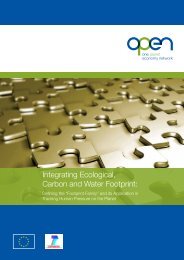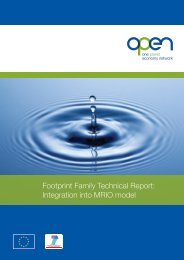OPEN: EU Scenario Storylines Report: - One Planet Economy Network
OPEN: EU Scenario Storylines Report: - One Planet Economy Network
OPEN: EU Scenario Storylines Report: - One Planet Economy Network
Create successful ePaper yourself
Turn your PDF publications into a flip-book with our unique Google optimized e-Paper software.
ut regulations require businesses to measure changes in their social and environmental<br />
performance.<br />
About 70-80% of Europeans live in high-tech accommodations located in close<br />
proximity to work and personal, social and community services. The education<br />
system reflects the global mindset of Europe and is highly internationalised, focusing on<br />
technology and adaptability.<br />
Compared to scenarios 1 and 4, most Europeans voluntarily spend more time working in<br />
order to enable additional consumption. Consumers value products and services based on<br />
their resource efficiency, as social status is now linked to sustainable living. They also<br />
demand high quality products; as a result, high quality, longer-lasting products are more<br />
profitable and dominate the market. By producing and selling more high quality products<br />
than today, companies are able to add more value while not increasing their resource<br />
inputs and this value is shared with workers in the form of higher wages. Economic<br />
growth is hence achieved without a growth in resource use and its related environmental<br />
impacts.<br />
Government policy is required to drive further changes in behaviour due to the<br />
higher growth and demand in this scenario compared with <strong>Scenario</strong> 1. Policies<br />
involve price signals such as the taxation of consumption of environmentally-harmful<br />
products and services rather than direct regulation. Consumers have provided early<br />
adopter markets for the new, developing technologies and consumer products. Ultimately<br />
this mix of regulation, taxation and advances in technology has delivered a net reduction<br />
in consumption for society overall.<br />
Improvements in energy efficiency have continued to contribute to a relative<br />
decoupling of energy use from economic growth in Europe between 2011 and<br />
2050, although overall energy demand has increased. Compared with <strong>Scenario</strong> 1,<br />
the focus in this <strong>Scenario</strong> is more on policies that encourage business models such as<br />
Energy Performance Contracting/Energy Services Companies, and less on forcing utilities<br />
to meet obligations. Smart metering is rolled out across the <strong>EU</strong> by 2020, enabling remote<br />
load control, but only with the customer‘s consent.<br />
On the supply side, emissions reductions are achieved via numerous costeffective<br />
low-carbon technologies such as large-scale off-shore wind and solar<br />
parks, widespread heat recuperation, and utilisation of local smart grids.<br />
However, centralised power generation is more of a feature than in <strong>Scenario</strong> 1, due to<br />
the higher level of demand for electricity and stronger economic growth focus.<br />
Ultimately, ambitious trans-continental projects such as Desertec (generating electricity<br />
from solar power plants in North Africa) are needed to enable the full decarbonisation of<br />
Europe‘s energy supply to keep emissions in check.<br />
Mobility is revolutionised, using less resources and energy. As oil and gas became<br />
very expensive and shortages in supply a regular phenomenon during the first quarter of<br />
the century, motor and alternative fuel technologies quickly advanced. From 2030, bans<br />
are enforced on conventional road vehicles. Most airplanes have been redesigned to<br />
become lighter, experience less drag and therefore need smaller engines that burn less<br />
fuel. Cars run with electricity made from renewable energy sources. Long distance travel,<br />
overall, is less necessary due to the maximum use of videoconferencing technologies.<br />
Page 25 of 57





